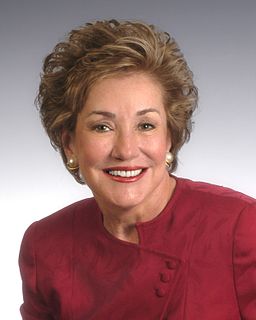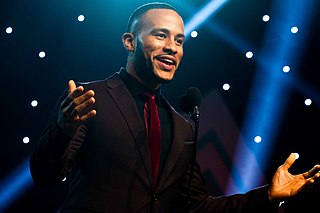A Quote by Elizabeth Dole
To be impacted. Then, once a policy is determined, you call on them to help.
Related Quotes
The policy that received more attention particularly in the past decade and a half or so has been the US cocaine policy, the differential treatment of crack versus powder cocaine and question is how my research impacted my view on policy. Clearly that policy is not based on the weight of the scientific evidence. That is when the policy was implemented, the concern about crack cocaine was so great that something had to be done and congress acted in the only way they knew how, they passed policy and that's what a responsible society should do.
I think I'm determined. And I think if you're determined, you're right. Your behavior is exactly the same when you're stubborn, except then you're wrong. And so, there's times when I'm wrong, and I'd say, "Well, you were the dark side of determined." But I think determination, you know, it's like have an idea, think about the idea, the risks involved. What does it take to get from here to there? And then once you make the choice, you just keep going.
If you really want to help, then help others to be more present. Help others to free themselves from the past. Help others to take responsibility for themselves. Help them to see how they are creating their own suffering. Every now and then, you will encounter innocent ones who are suffering through no fault of their own, particularly animals and children. Do not hesitate! Help them.
Sitting there with them, it was almost hard to remember when I first came to Perkins, so determined to remember to be a one-woman operation to the end. But that was the thing about taking help and giving it, or so I was learning; there was no such thing as really getting even. Instead, this connection, once opened, remained ongoing over time.
I don`t know if this is good politics or bad politics to criticize Trump, but you`ve got to call out, just like people in communities when people say racist things and feel it`s OK now to be a sexist or a racist or a misogynist or a bigot, individuals have to call them out, I have to call them out when I see it. You have to call out this president when he engages, when he hires somebody that makes people even more uncomfortable. I mean, it`s not a difference in policy. People in this country, the fear levels are higher than I can ever remember.
If, as a culture, we don’t bear witness to grief, the burden of loss is placed entirely upon the bereaved, while the rest of us avert our eyes and wait for those in mourning to stop being sad, to let go, to move on, to cheer up. And if they don’t — if they have loved too deeply, if they do wake each morning thinking, I cannot continue to live — well, then we pathologize their pain; we call their suffering a disease. We do not help them: we tell them that they need to get help.































